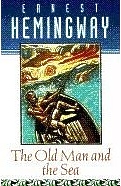When I was little, like many children, i liked to have a good lullaby ringing in my ears as i drifted off to sleep to chase away the shadows in the corner. My dad like to sing "O my darlin' Clementine," but my mom preferred softer songs like "Hush Little Baby." The one song that both of my parents liked to sing was from a CD they had of Irish Lullabies. Their favorite was called "Winkin, Blinkin and Nod," which my two sisters and I at the time particularly enjoyed. It pops up in my head every now and then, but i couldn't remember all the words. I asked my mom to write them down for me when i chose to analyze the motif of the Sea in literature, because I remembered it involved fishermen. These are the lyrics:
Winkin', Blinkin' and NodWinkin' and Blinkin' and Nod one night
Sailed off on a wooden shoe
Sailed down a river of crystal light
Into a sea of dew
"Now where are you going and what do you wish?"
The old moon asked the three
"We've come to fish for the Herring fish
That swim in this beautiful sea
Nets of silver and gold have we"
Said Winkin` and Blinkin` and Nod
The old moon laughed and sang a song
As they rocked in their wooden shoe
And the wind that sped them all night long
Ruffled the waves of dew
While the little stars were the Herring fish
That lived in the beautiful sea
"Now cast your nets where ever you wish
Never afeared are we"
So sang the stars to the fishermen three
Winkin' and Blinkin' and Nod
So all night long their nets they threw
To the stars in the twinkling foam
Then down from the sky came the wooden shoe
Bringing the fishermen home
'Twas all so pretty a sight it seemed
As if it could not be
And some folks thought 'twas a dream they dreamed
Of sailing the beautiful sea
But I shall name you the fishermen three
Winkin' and Blinkin' and Nod
Now Winkin' and Blinkin' are two little eyes
And Nod is a weary head
And the wooden shoe that sailed the skies
Is a wee one's trundle bed
So shut your eyes while mummy sings
Of the beautiful sights that be
And you will see all the wonderful things
As you rock in your misty sea
Where the old moon rocked the fishermen three
Winkin' and Blinkin' and Nod
Just like the fishermen three,
Winkin', blinkin' and Nod.
That magical, mysterious quality of the sea that has been so prevalent in the other literature I've analyzed is the cornerstone of this lullaby. Described as “dew,” “crystal light,” “misty,” “beautiful” and “twinkling foam,” the sea is extravagant in the way a child would appreciate. I can still draw up the image of a wooden shoe, bobbing on a sea that sparkles like diamonds, cool and dark with a full moon with a jolly face talking to the fishermen. The song uses this imagery to create a calming but paradoxically effervescent effect. The foaming sea is full of herring fish, and the fishermen are excited to cast their nets and haul them in, but the focus is on the sea itself. The listener cannot escape the beauty of the sea that is so fantastical; no one believes it is real. Perhaps it is just a dream, but no child would ever mind if it were, because dreams and reality can be equally beautiful. This feeling of quasi-reality is brought on by the intoxicating sea. It is a feeling Edna describes in The Awakening when she first swims in the water, the night her conscience is awakened, and she admits to herself her feelings for Robert. Robert uses island lore—the legend of a spirit that awakens in the sea under the full moon on the 28th of July—to explain Edna’s bizarre feelings. Her recount of the night is of a dreamy quality, a feeling the fishermen share, describing it “as if it could not be.” Santiago, in The Old Man and the Sea, also finds himself caught between dream and reality on his seaward sojourn. Exhausted by the fish and nearly starved, he begins to become confused by who is doing the catching: the man? or the fish? Being alone in the open ocean is like wandering in the desert; there is nothing to get your bearings, no proof to nail you to the ground. Edna, Santiago and the fishermen all feel this weightlessness, the freedom and fear of being without an anchor. In The Sea Limits, the voice of the sea is called “desire and mystery.” This perfectly fits the relationship all parties have with the Sea, in their own individual way. Santiago and Edna have the same pull towards the water as any child, especially one who lives by the sea. The same curiosity and hunger for exploration drive all to the edge of the sea, some never to return again. As I have found, the Sea is a part of my life that I’m unwilling to let go. Moving forward, I cannot imagine myself striking up permanent residence away from the sea. Even when it simply an unseen presence, the familiarity and the comfort of knowing that the waves are still crashing is something I can’t be without. I know that like the three fishermen, I will always find a way back to the ocean, because it is a part of who I was and also who I have become.









